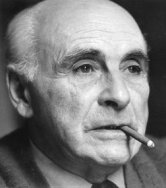Francis Ponge facts for kids
Francis Jean Gaston Alfred Ponge (born March 27, 1899 – died August 6, 1988) was a famous French writer and poet. He was known for his unique style of writing. He wrote short pieces of writing, called prose poems, that looked very closely at everyday objects.
Ponge was inspired by a style of art and writing called Surrealism. In 1974, he received the Neustadt International Prize for Literature, a major award for writers.
Contents
Life of Francis Ponge
Francis Ponge was born in Montpellier, a city in the south of France. His family was Protestant. His father, Armand Ponge, was a banker.
Francis studied law in Paris at the Sorbonne and the École de droit. From 1918 to 1919, he served in the French army. In 1919, he joined the Socialist Party. This was a political group that believed in social equality and public ownership.
Early Career and Influences
Ponge worked for publishing companies in Paris, like Editions Gallimard and Hachette. His first poems were published in 1923. He became well-known in French writing circles. He often wrote for a famous magazine called Nouvelle Revue Française.
The editor of this magazine, Jean Paulhan, became Ponge's mentor. A mentor is someone who guides and advises another person. They stayed in touch for many years. In the 1930s, Ponge was briefly connected with the Surrealist movement. This movement explored dreams and the imagination. Influenced by these ideas, he joined the Communist Party in 1937. This party believed in a society where everyone is equal and resources are shared.
War Years and Later Life
During World War II, Ponge joined the French Resistance. This was a secret group that fought against the occupation of France. He also worked for the National Committee of Journalists. From 1944 to 1946, he was a literary and artistic director for a communist newspaper called L'Action. He left the Communist Party in 1947.
From 1952 to 1965, Ponge taught at the Alliance française in Paris. This is a famous school for French language and culture. In 1966 and 1967, he was a visiting professor in the United States at Barnard College and Columbia University.
In his later years, Ponge lived a quiet life at his country house. He passed away in Le Bar-sur-Loup when he was 89 years old.
Awards and Honors
Francis Ponge received several important awards for his writing. These included:
- The Neustadt International Prize for Literature in 1974.
- The French National Poetry Prize from the Académie française in 1981.
- The Grand prix of the Société des gens de lettres in 1985.
He was also made a Commandeur of the Légion d'honneur in 1983. This is one of France's highest honors.
Francis Ponge's Works
Ponge's most famous work is Le parti pris des choses. This title is often translated as The Voice of Things. In this book, he carefully described common items. These included oranges, potatoes, and cigarettes. He wrote about them in a poetic way, but in a paragraph form. This style is called a prose poem. It is a poem written like an essay.
His Unique Writing Style
Ponge did not try to make readers feel strong emotions or use many symbols. Instead, he wanted to perfectly show the world of everyday objects. He called his own works "a description-definition-literary artwork." He felt his writing was different from a dry dictionary or a simple poem. His main goal was to avoid common or stereotypical ways of thinking.
In his book Le Grand Recueil (The Grand Collection), published in 1961, he explained his focus. He said he concentrated on simple objects like stones and grass. He wanted to bring back the power and purity of language.
Le Savon (Soap)
In 1967, Ponge published another well-known work called Le Savon. It was translated as Soap in 1969. This is a long prose poem. It explores everything about the word "soap" and the actual object. It does this in a very funny way.
Here is a small part from the original French version and its English translation:
|
Le Savon |
Soap |
Another one of his works is 'La Guêpe'. This was a clever play on words about the painter Émile Picq.
See also
 In Spanish: Francis Ponge para niños
In Spanish: Francis Ponge para niños
 | Chris Smalls |
 | Fred Hampton |
 | Ralph Abernathy |


